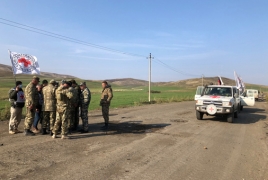
The sides of the Nagorno-Karabakh conflict continue collecting and exchanging remains of fallen soldiers under the auspices of the Russian peacekeeping forces and in the presence of the International Committee of the Red Cross as a humanitarian neutral intermediary, the ICRC said in a statement on Wednesday, December 23.
"All the steps in the identification process take quite some time. While it is painful for families, there will be a need for a lot of patience to allow the staff in charge of this process to be as accurate and as professional as possible," the Committee said.
The ICRC also shared some details from the process:
– When a retrieval operation is organized by the authorities, ICRC representatives are invited to participate as observers. They cannot confirm the place and time of retrieval operations decided by the sides.
– Retrieval of remains is merely one step in the identification process, which begins before retrieval operations with the collection and analysis of data on deceased individuals and their current location.
– Following the retrieval, remains are then analyzed at a forensic examination facility. Depending upon the situation, multiple types of analysis may be necessary.
– The legal step of identifying remains only comes after the preceding steps.
–It is not until all necessary steps of the identification process take place and a positive identification is made that deceased individuals can be returned to their families.
Armenian Prime Minister Nikol Pashinyan, Russian and Azerbaijani Presidents Vladimir Putin and Ilham Aliyev on November 9 signed a statement to end the war in Karabakh after almost 45 days. Under the deal, the Armenian side has returned all the seven regions surrounding Nagorno-Karabakh, having lost a part of Karabakh itself in hostilities.

